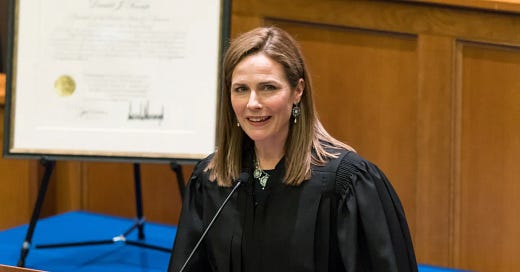Bonus 72: Administrative Stays and Justice Barrett's SB4 Concurrence
Justice Barrett is right that "administrative" stays should rarely provide a basis for emergency relief from the Supreme Court, but she's wrong about *why.* That error led her (and the Court) astray.
Welcome back to the weekly bonus content for “One First.” Although Monday’s regular newsletter will remain free for as long as I’m able to do this, much of the bonus content is behind a paywall as an added incentive for those who are willing and able to support the work that goes into putting this newsletter together every week. I’m grateful to those of you who are already paid subscribers, and hope that those of you who aren’t will consider a paid subscription if and when your circumstances permit:
As I noted in yesterday’s special extra issue summarizing the crazy twists and turns in the SB4 litigation, there’s a lot to say about Justice Barrett’s concurring opinion (joined by Justice Kavanaugh) respecting the Court’s unexplained order Tuesday afternoon in United States v. Texas, which put Texas’s controversial new immigration law back into effect (at least temporarily). Yesterday, I focused on the second part of the Barrett/Kavanaugh opinion—the not-so-subtle nudge to the Fifth Circuit to move far more quickly on Texas’s application for a stay pending appeal of the district court’s injunction blocking SB4. That nudge worked as well as could possibly have been expected; not only did the court of appeals hastily schedule (and hold) oral argument on the application; it vacated a different panel’s prior administrative stay along the way, so that, even without the Supreme Court’s intervention, SB4 was back on hold by 10:44 p.m. EDT Tuesday night.
But my focus today is on the first part of the Barrett/Kavanaugh concurrence—in which Justice Barrett argues for a soft presumption against the Supreme Court ever granting emergency relief to vacate lower-court “administrative” stays (as opposed to stays pending appeal). To make a long story short, I think Justice Barrett is exactly right that properly utilized administrative stays from lower courts should, intrinsically, seldom provide a basis for emergency relief from the justices. Not for the first time, Justice Barrett is publicly ruminating, to a greater extent than any of her colleagues, on important and unanswered questions about the Court’s role vis-à-vis applications for emergency relief from lower-court rulings. And we’re the better for it. What’s more, the concurrence may reduce the overall number of administrative stays that look like stays pending appeal—and that’s a good thing, too.
The problem is that Barrett is wrong as to why even those administrative stays that remain should generally not be subject to emergency relief—in a way that illustrates why both of the dissenting opinions had the better of the argument for overriding that presumption and vacating the administrative stays in the SB4 case, specifically.
For those who are not paid subscribers, the next free installment of the newsletter will drop on Monday morning. For those who are, please read on.
Keep reading with a 7-day free trial
Subscribe to One First to keep reading this post and get 7 days of free access to the full post archives.




